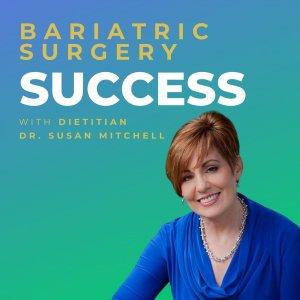Bariatric Surgery Success

#65 Snooze to Lose: The Tie Between Sleep and Weight
Procarenow.com for free samples. Use Code: Susan10 to save 10%
Ever noticed that when you don’t sleep well, you’re more hungry than usual? If you don’t get enough sleep over time, what happens? Your weight starts to creep up, right? Is there a tie between sleep and weight regain?
Hi, I’m registered dietitian nutritionist Dr. Susan Mitchell. You’re listening to the Bariatric Surgery Success podcast episode number 65. Most of my career I’ve worked in some type of media, particularly radio where I did morning drive nutrition spots for over 18 years. That’s what lead me to start podcasting and ultimately to you. I created Bariatric Surgery Success to provide you with life-changing information based on science along with simple strategies and tools to help you be successful in your transformation and your entire journey. So happy you’ve connected with me. You’re in the right place and I’m glad you’re listening.
By the way, if you’re searching for a private facebook group where you can ask questions and talk about what’s on your mind, come join me. The group is called Bariatric Surgery Success with dietitian Dr. Susan Mitchell.
Link to private Facebook group: https://www.facebook.com/groups/bariatricsurgerysuccesswithdrsusanmitchell
What’s going on with your right now? Do you find yourself sleeping less and less? How many hours of sleep a night do you average? Seven? Six? Five? Less than that? Are you dragging during the day? Feeling irritable?
On average, we're sleeping an hour an a half less a night than 20 years ago. The saying you snooze, you lose definitely takes on a new meaning when you’re talking weight regain.
Sound science says that sleep deprivation, defined as under six hours of sleep a night, results in the increased production of the hunger hormone ghrelin. Too little sleep also kicks up your stress level by increasing the stress hormone cortisol which then increases your appetite. What if you’re trying to get more sleep yet have a lot of stress in your life? Does stress affect your sleep? So here’s the question. Is it stress that makes you have trouble sleeping, eat more and regain weight or is it too little sleep that makes you more stressed, eat more and gain?
Plus do you notice that when you don’t get enough sleep, you’re not only hungry, but you have an attitude? Call it angry and hungry or maybe you’ve heard the word for both anger and hunger. You’re hangry.
Bottom line: the less sleep you get, the more it fuels hunger with reports of eating up to 1000 calories more per day and a bad attitude.
A better night’s sleep potentially means less weight regain and more productive days.
THE GOOD NEWS: When you increase the amount of sleep you get and average 7-8 hours per night, hunger hormones and hunger itself seem to return to normal.
Try these tips to help you get that solid 7-8 hours of shut eye:
1. Most important: make the decision that you’re going to get more sleep. Then set a reminder, start a get-ready-for-bed routine, whatever it takes and then go to bed at the same time each night so your body learns a routine and starts to tell you that it’s bedtime.
2. Unplug for 30 minutes before bed: research shows that the bright lights from your favorite devices including cell phones, TV, computers and tablets decrease the body’s production of melatonin, a hormone whose job it is to help make you feel tired and ready to fall asleep.
3. Keep your room cool and dark so your body wants to sleep.
4. Listen to relaxing music or meditations or sounds that de-stress you like ocean waves or rain.
5. Stressed and you know it? Actually set a worry time, think about your issues, journal your thoughts if you want and then let them go for the night.
Sleep is like nutrition for your brain. You’ve got to have it. Speaking of nutrition to help you sleep. Try these two tips.
- Include bananas, fish, oats, and chickpeas in your diet. These foods contain vitamin B6, which helps the body produce melatonin, the sleep-inducing hormone.
- As you can tolerate them, eat tart cherries (they can be dried, fresh or frozen) and nuts regularly as they contain melatonin.
Recipe for Chocolate Cherry Bread. The recipe calls for tart cherries, walnuts and banana. It’s scrumptious. Spread almond or peanut butter on a slice or half slice depending on your portion needs for a snack.
Remember, better sleep and more sleep begins with you making the decision that you’ll go to bed and increase the hours you sleep. Tweak your diet with the melatonin and B-6 rich foods. Try some of the sleep tips. Let me know how they work for you.
Stay focused on your journey, you're worth it.






 Visit Podcast Website
Visit Podcast Website RSS Podcast Feed
RSS Podcast Feed Subscribe
Subscribe
 Add to MyCast
Add to MyCast